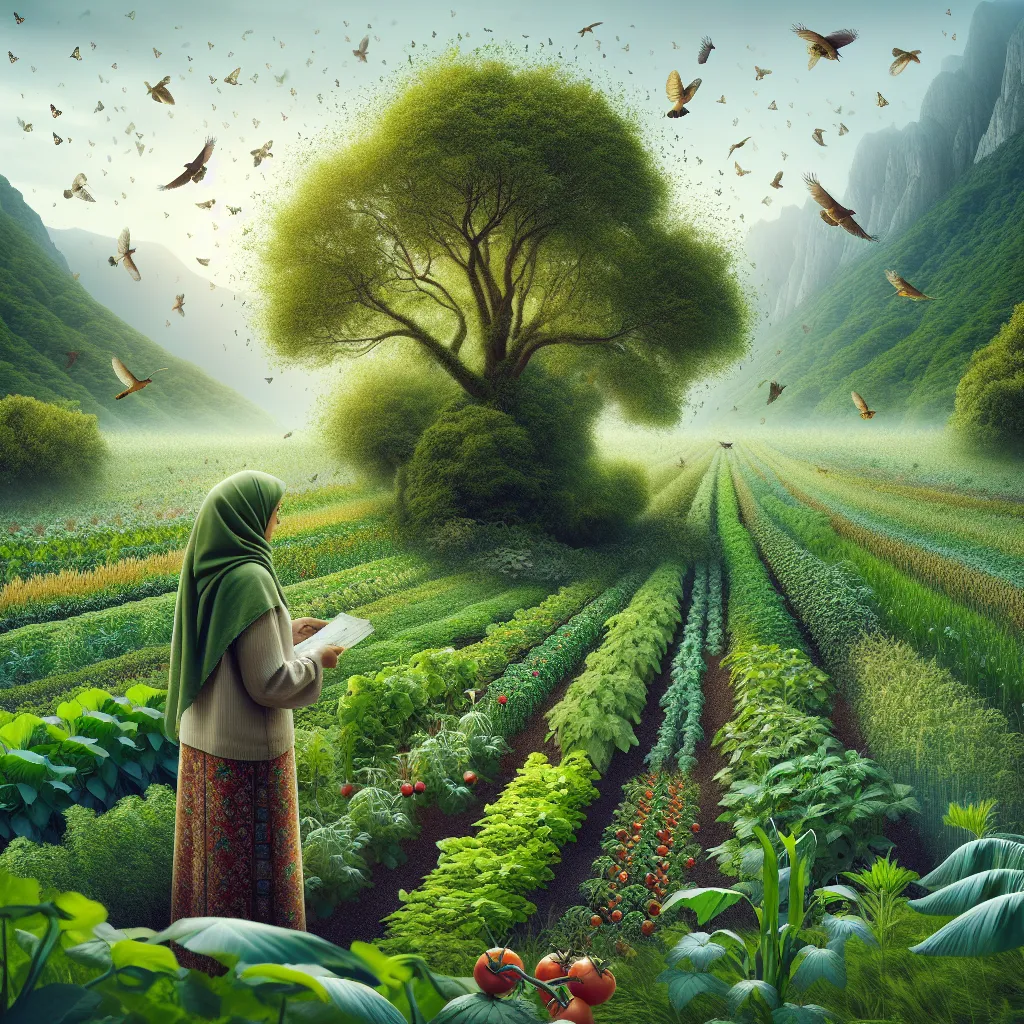Sustainable farming is a crucial topic that frequently appears in IELTS Writing Task 2 questions. Its relevance to global environmental and food security issues makes it a popular subject for test-makers. Based on past exam trends and the increasing importance of sustainability in agriculture, we can expect this theme to continue appearing in future IELTS exams. Let’s explore a sample question and develop a high-scoring response on this topic.
Analyzing the Question
Some people believe that farmers should focus solely on producing food, while others argue that farmers should also prioritize environmental protection. Discuss both views and give your own opinion.
This question presents two contrasting viewpoints on the role of farmers in food production and environmental protection. It requires candidates to:
- Discuss the perspective that farmers should focus only on food production
- Examine the argument for farmers prioritizing environmental protection alongside food production
- Provide a personal opinion on the issue
Sample Essay
Here’s a model answer that addresses all parts of the question:
In recent years, there has been considerable debate about whether farmers should concentrate exclusively on food production or if they should also take environmental protection into account. While both perspectives have merit, I believe that a balanced approach considering both food security and environmental sustainability is crucial for long-term agricultural success.
Those who argue that farmers should focus solely on producing food often cite the growing global population and increasing food demand as their primary concerns. They contend that maximizing crop yields and livestock production should be the top priority to ensure food security for all. This view emphasizes the use of intensive farming methods, including chemical fertilizers and pesticides, to boost productivity. Proponents of this approach argue that without such focus, we risk widespread food shortages and potential famine in many parts of the world.
On the other hand, advocates for environmental protection in farming practices highlight the long-term sustainability of agriculture. They argue that overexploitation of natural resources and excessive use of chemicals can lead to soil degradation, water pollution, and loss of biodiversity. These environmental impacts could, ironically, undermine future food production capabilities. Supporters of this view promote organic farming, crop rotation, and other eco-friendly practices that preserve the health of ecosystems while still producing food.
In my opinion, the most effective approach is to strike a balance between food production and environmental protection. Sustainable farming practices can actually enhance long-term productivity while minimizing ecological damage. For instance, using natural pest control methods and organic fertilizers can maintain soil health, leading to consistent yields over time. Moreover, preserving biodiversity can help crops become more resilient to climate change and pest outbreaks. By adopting such methods, farmers can ensure both current food security and the ability to feed future generations.
In conclusion, while the need for increased food production is undeniable, it should not come at the cost of environmental degradation. Farmers should strive to implement sustainable practices that meet current food demands while safeguarding the environment for future agricultural needs. This balanced approach is not only beneficial for the planet but also crucial for the long-term viability of farming itself.
(Word count: 329)

Writing Tips for This Topic
When addressing topics related to sustainable farming in IELTS Writing Task 2, consider the following tips:
-
Use specific examples: Incorporate concrete examples of sustainable farming practices to support your arguments.
-
Balance perspectives: Ensure you give equal consideration to both viewpoints before presenting your opinion.
-
Use appropriate transitions: Employ linking words to connect ideas smoothly between paragraphs and sentences.
-
Demonstrate critical thinking: Show your ability to analyze complex issues by discussing both short-term and long-term implications of farming practices.
-
Use varied sentence structures: Mix simple and complex sentences to enhance the flow of your essay.
Key Vocabulary for Sustainable Farming Essays
Here are some useful terms to incorporate into your essay:
-
Sustainable agriculture (noun) /səˈsteɪnəbl ˈæɡrɪkʌltʃər/: Farming practices that ensure long-term productivity without harming the environment.
-
Biodiversity (noun) /ˌbaɪəʊdaɪˈvɜːsəti/: The variety of plant and animal life in a particular habitat.
-
Crop rotation (noun) /krɒp rəʊˈteɪʃn/: The practice of growing different types of crops in the same area in sequential seasons.
-
Organic farming (noun) /ɔːˈɡænɪk ˈfɑːmɪŋ/: A method of farming without the use of synthetic chemicals or genetically modified organisms.
-
Ecosystem services (noun) /ˈiːkəʊsɪstəm ˈsɜːvɪsɪz/: The benefits people obtain from ecosystems, such as clean water and pollination.
-
Agroecology (noun) /ˌæɡrəʊɪˈkɒlədʒi/: The study of ecological processes applied to agricultural production systems.
-
Food security (noun) /fuːd sɪˈkjʊərəti/: The state of having reliable access to a sufficient quantity of affordable, nutritious food.
-
Permaculture (noun) /ˈpɜːməkʌltʃər/: A system of agricultural and social design principles centered on simulating or directly utilizing the patterns and features observed in natural ecosystems.
Conclusion
Sustainable farming is a complex and multifaceted topic that is likely to remain relevant in IELTS Writing Task 2. By understanding the key issues and vocabulary associated with this subject, you’ll be well-prepared to tackle related questions. Remember to practice writing essays on various aspects of sustainable agriculture, such as:
- The role of technology in promoting sustainable farming
- Government policies to encourage eco-friendly agricultural practices
- The economic impacts of transitioning to sustainable farming methods
- The relationship between sustainable agriculture and climate change mitigation
By exploring these related topics, you’ll develop a comprehensive understanding of sustainable farming, enabling you to write compelling essays in your IELTS exam.
For more information on related topics, you might find these articles helpful: